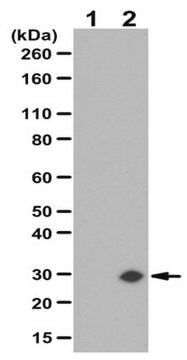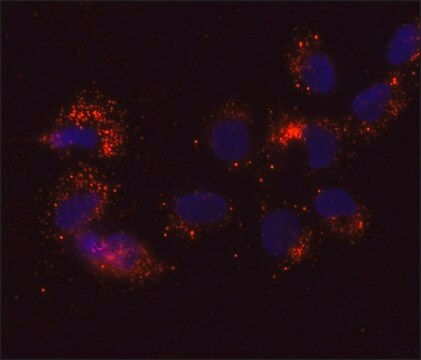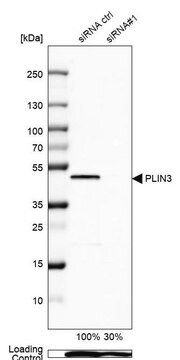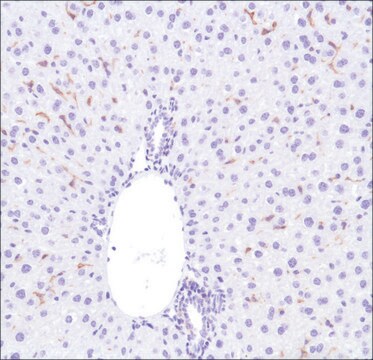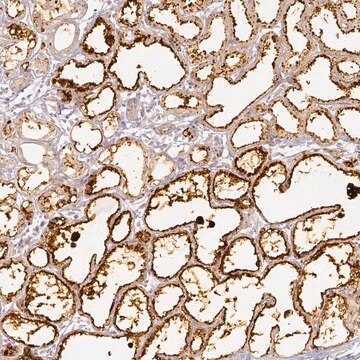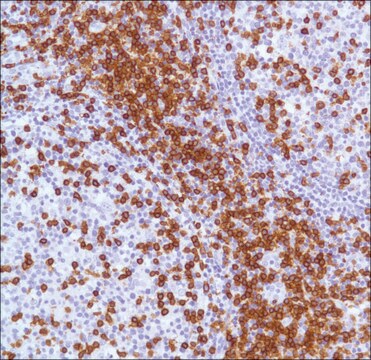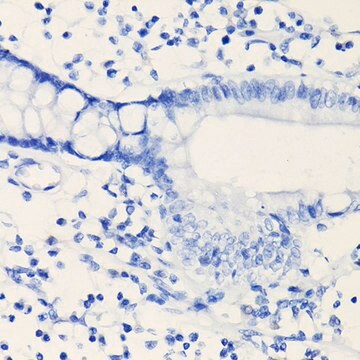SAB4200879
Anti-DDX6-Alexa488 antibody, Mouse monoclonal
clone DDX6-34, purified from hybridoma cell culture
Synonym(s):
ATP-dependent RNA helicase p54, DEAD box protein 6, HLR2, Oncogene RCK, Probable ATP-dependent RNA helicase DDX6
Sign Into View Organizational & Contract Pricing
All Photos(1)
About This Item
UNSPSC Code:
12352203
NACRES:
NA.43
Recommended Products
conjugate
ALEXA FLUOR™ 488 conjugate
Quality Level
antibody form
purified from hybridoma cell culture
clone
DDX6-34
form
liquid
species reactivity
bovine, monkey, canine, human, mouse
concentration
1.5-2 mg/mL
isotype
IgG1
UniProt accession no.
shipped in
dry ice
storage temp.
−20°C
target post-translational modification
unmodified
General description
Probable ATP-dependent RNA helicase DDX6 also known as DEAD box protein 6 or Oncogene RCK/p54, is a conserved member of the DEAD-box RNA helicase family.DDX6 plays a central role in P-body assembly in mammals and its depletion prevents P-body assembly leading to P-bodies disappearance.1
Specificity
Monoclonal Anti-DDX6 antibody specifically recognizes DDX6 from human, mouse, monkey, canine and bovine origin.
Application
The antibody may be used in Immunofluorescence techniques to detection of DDX6.
Biochem/physiol Actions
DDX6 coordinates RNA and ATP helicase binding activities and binds along the mRNA. DDX6 sequence specific binding at mRNA 5′ end, activates recruitment of the decapping complex, thus coupling translational repression and mRNA degradation.1-2 DDX6 is considered to be a P-bodies marker due to its mediating role between translational repression and P-bodies formation and toits interaction with Ago2 and the RISC complex that also mediates translational silencing by miRNAs.1-4
Viruses like Hepatitis C virus (HCV) or West Nile virus (WNV) utilize the host cell DDX6 to promote virus infection by recruiting it to the viral replication sites where it is involved in stabilization of the viral genome and the shift between translation and replication.2,5-6
DDX6 was reported to be overexpressed in colorectal adenocarcinomas, gastric cancer and in most malignant cell lines.7-9 It was suggested that DDX6 acted as an upstream cancerous enhancer through RNA-binding of HER2 and FGFR2 mRNAs that positively regulates post-transcriptional processes in cancer cells.7
Viruses like Hepatitis C virus (HCV) or West Nile virus (WNV) utilize the host cell DDX6 to promote virus infection by recruiting it to the viral replication sites where it is involved in stabilization of the viral genome and the shift between translation and replication.2,5-6
DDX6 was reported to be overexpressed in colorectal adenocarcinomas, gastric cancer and in most malignant cell lines.7-9 It was suggested that DDX6 acted as an upstream cancerous enhancer through RNA-binding of HER2 and FGFR2 mRNAs that positively regulates post-transcriptional processes in cancer cells.7
Physical form
Supplied as a solution in 0.01 M phosphate buffered saline pH 7.4, containing 15 mM sodium azide as a preservative.
Storage and Stability
For continuous use, store at 2-8°C for up to one month. For extended storage, freeze in working aliquots. Repeated freezing and thawing is not recommended. If slight turbidity occurs upon prolonged storage, clarify the solution by centrifugation before use. Working dilution samples should be discarded if not used within 12 hours. Protect from prolonged exposure to light.
Legal Information
ALEXA FLUOR is a trademark of Life Technologies
Disclaimer
This product is for R&D use only, not for drug, household, or other uses. Please consult the Material Safety Data Sheet for information regarding hazards and safe handling practices.
Storage Class Code
12 - Non Combustible Liquids
WGK
nwg
Choose from one of the most recent versions:
Certificates of Analysis (COA)
Lot/Batch Number
Sorry, we don't have COAs for this product available online at this time.
If you need assistance, please contact Customer Support.
Already Own This Product?
Find documentation for the products that you have recently purchased in the Document Library.
Our team of scientists has experience in all areas of research including Life Science, Material Science, Chemical Synthesis, Chromatography, Analytical and many others.
Contact Technical Service